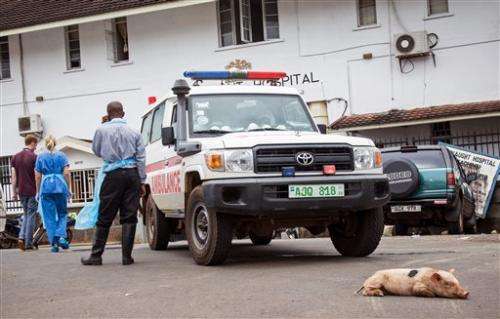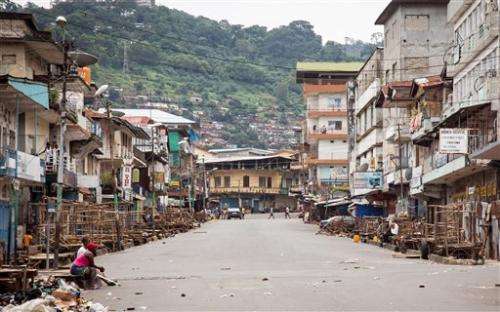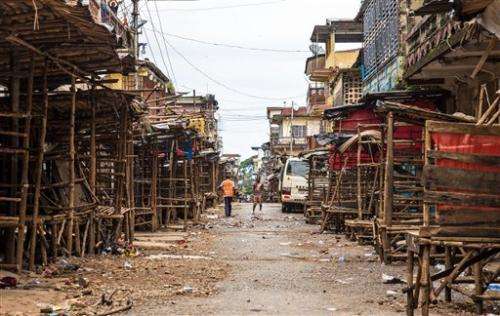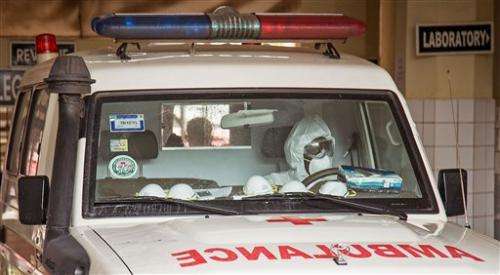Streets bustling after Sierra Leone shutdown ends

Streets in Sierra Leone's capital bustled again Monday after an unprecedented nationwide shutdown during which officials said more than 1 million households were checked for Ebola patients and given information on the deadly disease.
But it remained unclear if the three-day effort would help curb the spread of a disease that is blamed for the deaths of more than 2,600 people in West Africa. Authorities have not yet said how many new suspected cases were discovered over the three days, but at least 71 bodies were buried during the shutdown.
Joe Amon, director of health and human rights for Human Rights Watch, said there was little reason to believe the lockdown had been effective in ending transmission since such measures are so hard to enforce.
"You could argue that it's strictly necessary not because it's an effective way to break transmission but because it's necessary to reach people with communication messages," he said.
Teams carrying soap and information about Ebola reached about 75 percent of 1.5 million households in this nation, the health ministry said. Some residents complained of food shortages, as others sat out on verandas. Rumors that the soap being distributed had been poisoned called into question the education efforts.

More than 560 people are believed to have died from the dreaded disease in Sierra Leone, a nation of 6 million people. Ebola has also spread rampantly through Liberia and Guinea and a limited number of cases have been reported in Nigeria and one in Senegal.
Treatment centers are overwhelmed with patients almost as soon as they're built and health workers struggle to keep up with monitoring the contacts of thousands of sick people. So the hardest hit countries have resorted to extraordinary measures. Liberia has cordoned off entire towns or neighborhoods, and Sierra Leone's nationwide shutdown was a first.
The World Health Organization has not said clearly whether it supports such measures, saying they should only be undertaken if people's rights are protected and the measures are proportionate and evidence-based. But so much in this outbreak is new—from its large geographic spread to the number of people infected to the government response—that evidence on the best way to contain it is scarce.
The U.N. health agency has, however, repeatedly said that the border closures and flight bans many countries have put in place to protect themselves from Ebola are counterproductive. It reiterated on Monday that such restrictions are hindering "relief and response efforts, risking further international spread."
Later Monday, Sierra Leone officials are expected to announce how many cases of Ebola were found during the three-day shutdown and how many dead were discovered. The government has ordered tents for temporary treatment centers to make room for any new cases discovered, said Abdulai Bayraytay, a government spokesman.

The scale of the outbreak—Ebola is believed to have infected more than 5,500 people—has strained the resources of countries with poor health systems in the best of times. Liberia, which has been hardest hit by the disease, opened its largest Ebola clinic to date on Sunday.
No sooner had the ceremony to open the 150-bed center ended than ambulances rushed there with patients.

Because there are too few beds to treat patients and too few ambulances to pick them up, people wait hours or even days before being taken to hospitals. Ambulances are often packed with several patients, said William Ross, a first responder in Monrovia, and many die on the way to the hospital.
The outbreak has also suffered from a lack of doctors and nurses trained to treat Ebola patients, numbers that have been further depleted by the unprecedented number of infections in health workers. More than 300 have been infected, and about half of those have died. A Spanish priest who became infected while serving as a medical director for a hospital in Sierra Leone was flown back to Spain on Monday.
© 2014 The Associated Press. All rights reserved.















